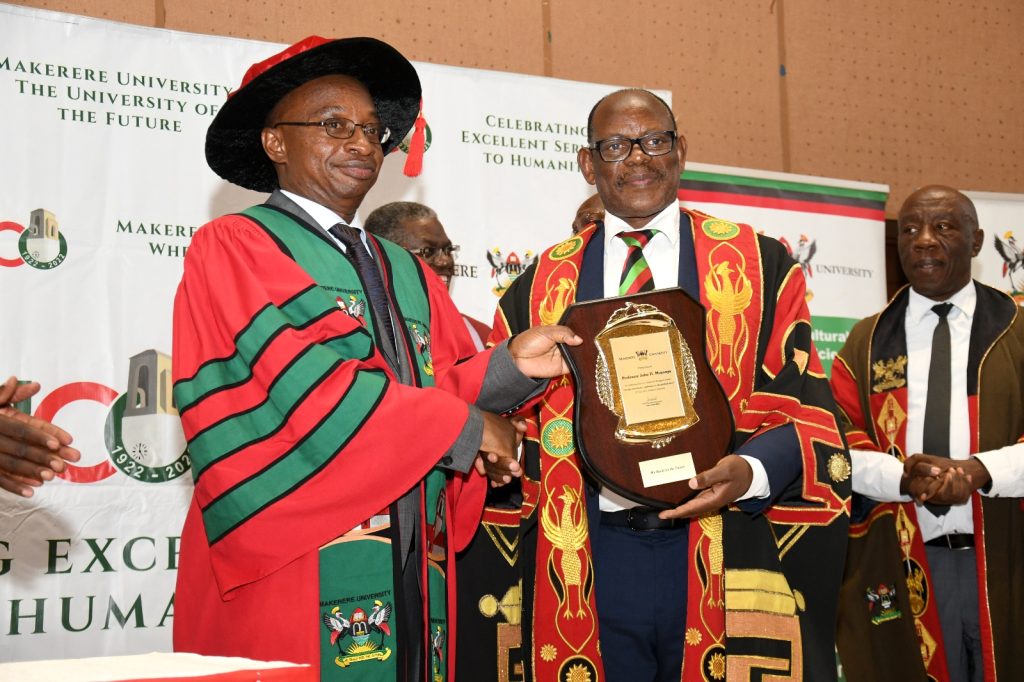
Theme: Circular Bio-economy: Applications to the Agri-food Sector
*****In his Lecture, Prof. John H. Muyonga highlighted the nutritional value of waste from agri-food products and explained the measures that can be taken to minimize wastage
The Inaugural Lecture
A lot of what is thrown away as waste from agri-food products contains nutrients that are crucial for the body’s immunity. This was revealed by Prof. John H. Muyonga during his Professorial Inaugural Lecture held on 23 June 2023 at the Yusuf Lule Central Teaching Facility, Makerere University. Organized under the theme: Circular Bio-economy: Applications to the Agri-food Sector, the lecture was graced by the University Top Management led by the Vice Chancellor, Prof. Barnabas Nawangwe, and attended by academics and administrators from the 10 Colleges of Makerere, as well as the family of Prof. Muyonga. Prof. Muyonga.
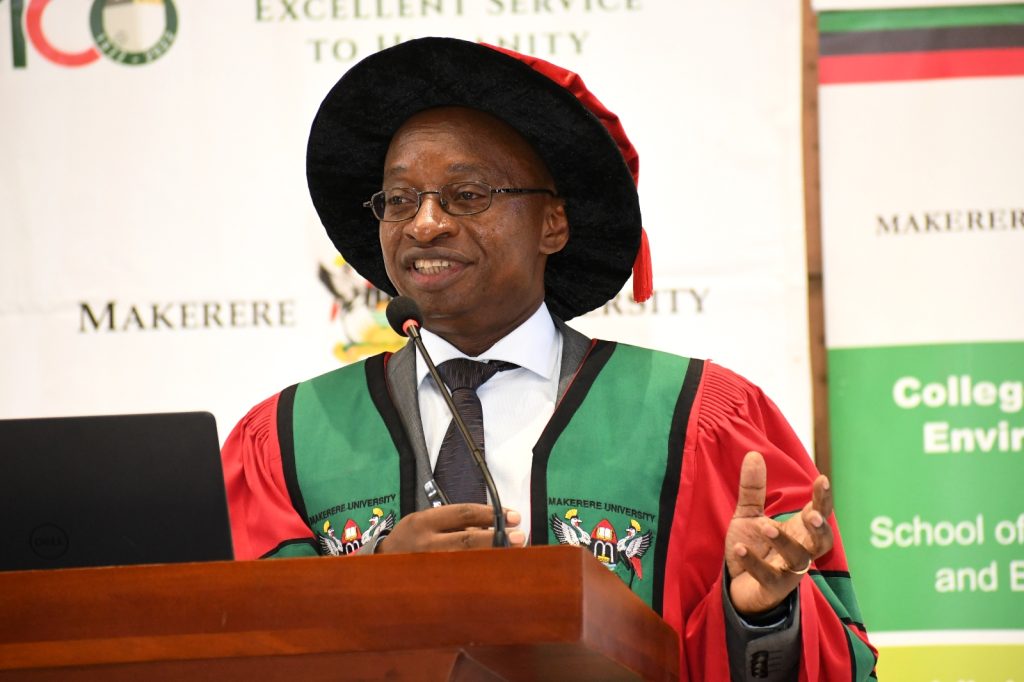
The health benefits of waste from agri-food products
In his presentation, Prof. John H. Muyonga, a Professor of Food Science at the Department of Food Technology and Nutrition, College of Agricultural and Environmental Sciences (CAES), Makerere University revealed that waste of plant origin contains nutrients and a wide diversity of non-nutrient compounds (phytochemicals), that are associated with health benefits. “The non-starch polysaccharides from fruits, vegetables and whole cereals help prevent cancer, hypertensive, hypoglycemic, and hypochloresterol. Carotenoids found in coloured fruits and vegetables equally prevent hypertensive, cancer, obesity, and support vision. The phytosterols in cereals and legume cereals bran serve as antioxidants and help in the prevention of colon cancer and hypochloresterol effect, hypertensive, pytic acid, and kidney stone formation,” Prof. Muyonga explained, further highlighting valuable components of waste from selected food crops. Citrus peels and seeds contain Pectin, essences, ethanol, D-limonene, limonoids and flavonoids. Mango peels and kernels contain fibre, vitamins, carotenoids and polyphenols, kernal fat and pectin. Passion fruit seeds and rind contain pectin and linoleic acid. Banana peels have phenolics, beta-carotenoids, anthocyanins, fiber, amino acids, polyunsaturated fatty acids, vitamins, flavonoids and potassium, whereas Avocado seeds and peels contain carbohydrates, proteins, lipids, fibres, minerals, phenolics, flavonoids, and fatty acids. Prof. Muyonga also highlighted a number of valuable components in waste from animal-based foods emphasizing the need to minimize wastage. According to Prof. Muyonga, increased adoption of circular bio-economy principles can help minimise wastage. Circular bio-economy entails reuse of as much bio-waste as possible, resulting in multiple value added products from a given volume of harvested biomass. Circular bio-economy can be used to explore the use of waste streams as raw materials for products such as new food products, feed, fuel, industrial ingredients, bio-plastics, biopharmaceuticals, bio-cosmetics, enzymes, nutritional supplements, nutraceuticals, materials for tissue repair, plasma substitutes, microbes and adsorbents. Circular bio-economy decreases dependency on natural resources by encouraging sustainable goods that generate food, feed, materials and energy using biological resources.
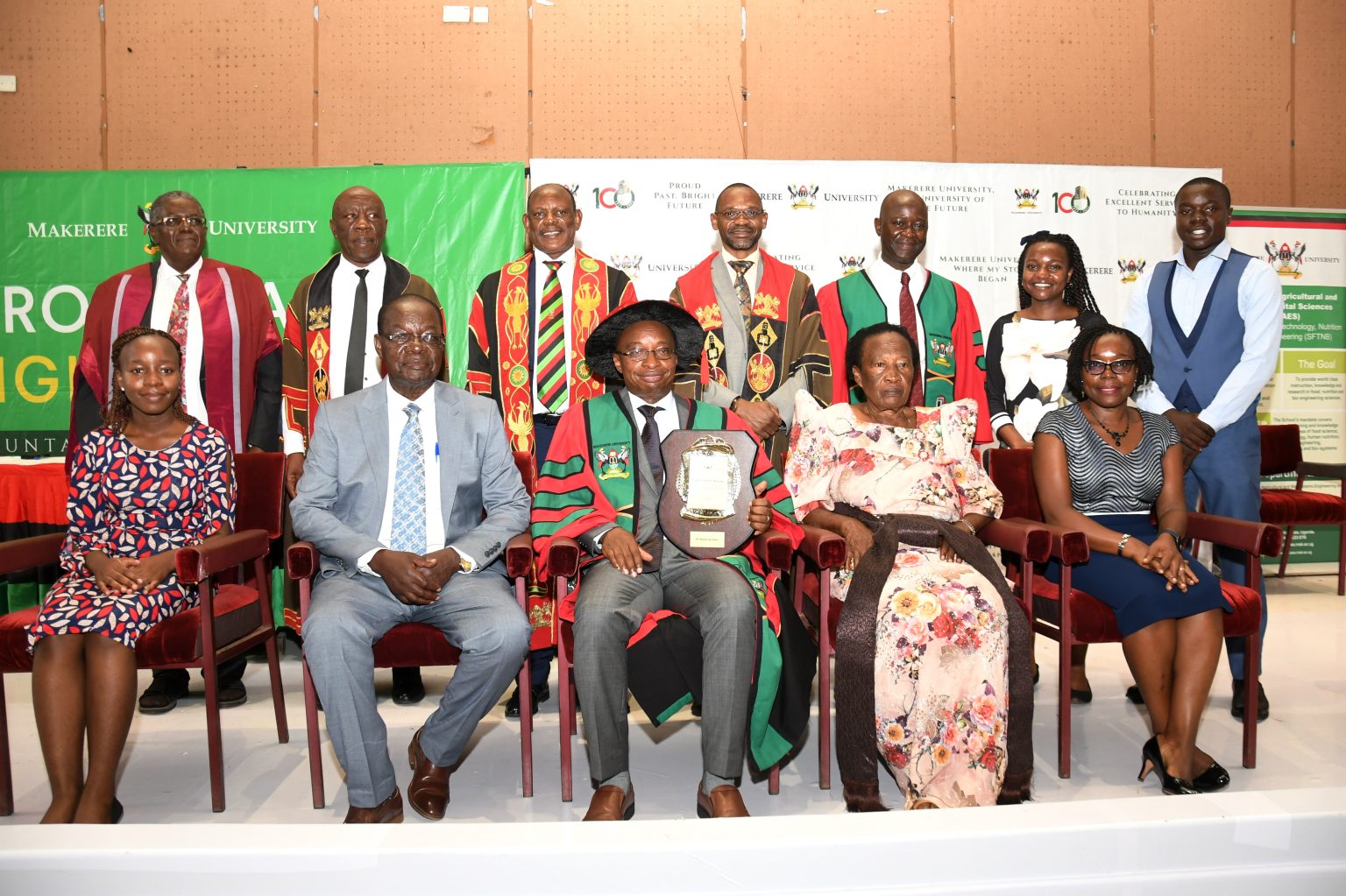
Minimising wastage of agri-food products
During his 26 years at Makerere University, Prof. Muyonga has been key in developing research capacity on previously under researched foods including grain amaranth, jackfruit, pumpkins, Solanum anguivi (katukuma), and Nile perch, among others. Working with a number of partners, he has conducted research and come up with various technologies to minimize wastage in agri-food products. Given the Nutraceutical properties of jackfruit pulp, he has conducted research and developed protocols for drying jackfruit pulp using the Refractance Window Drying technology. He has conducted studies on pumpkin and produced shelf stable flours from seed and pulp of pumpkins. Flour from the seeds is high in phytochemicals and it is recommended for weight control. Together with his research team, they have processed sweetpotato products into shelf-stable value added products. He has also conducted research on jackfruit pectin. The work entailed extracting pectin from jackfruit and assessing its properties. He also worked on the production and utilisation of passion fruit powder. Other key activities included; Tamarind seed analysis and utilisation- Tamarind seed powder was found to be suitable for use as ingredient to enhance nutraceutical properties of juices and cookies; Nile Perch collagen and gelatin studies – Collagen has a unique amino acid profile that gives it peculiar properties, including the ability to form gels when dissolved in water; Nile Perch oil extraction and Characterisation- Fish oils are rich in omega 3 fatty acids. Omega 3 fatty acids contribute to brain development and protection against cardiovascular diseases, breast, colon and prostate cancer, inflammation, depression, pain and psychosis. He also worked on characterisation of cassava leaf, processing and utilisation. Cassava leaves were found to be high in proteins, carbohydrates, beta-carotene, polyphenols and ascorbic acid.
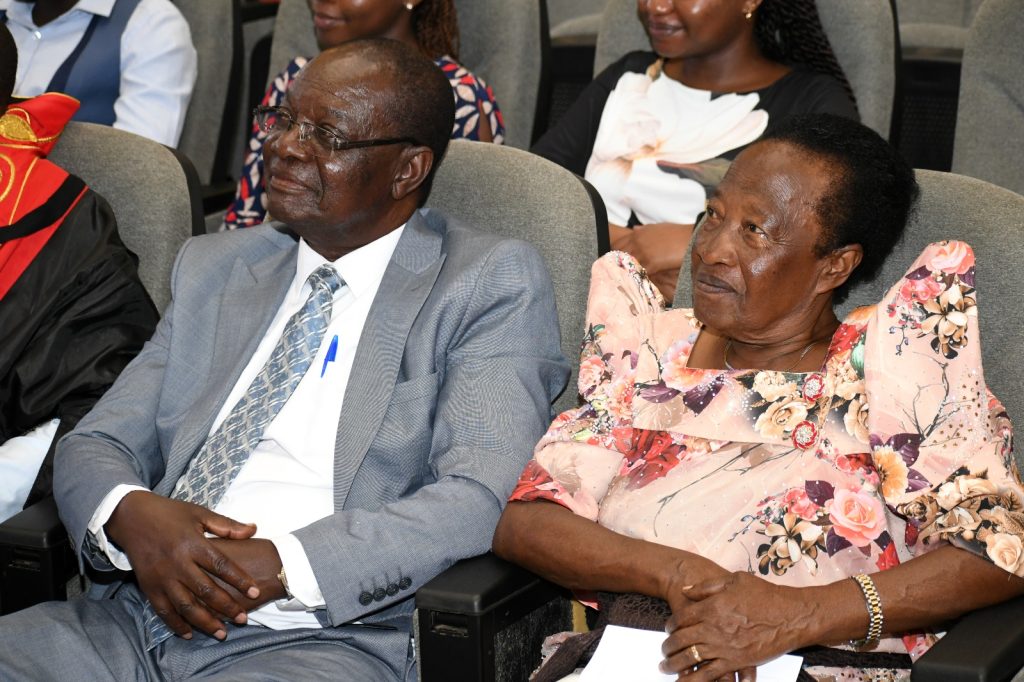
Future plans
In future, Prof. Muyonga intends to work on the characterization of by-products from more agri-food materials produced in Uganda. He also hopes to work on the application of novel and sustainable technologies in agri-food waste valorisation to improve extraction efficiency, efficacy and limit environmental impact; and to evaluate new applications of components of agri-food waste – e.g. in bio-based packaging and bio-preservation. Prof. Muyonga also plans to undertake policy and techno-economic analysis of valorisation options.
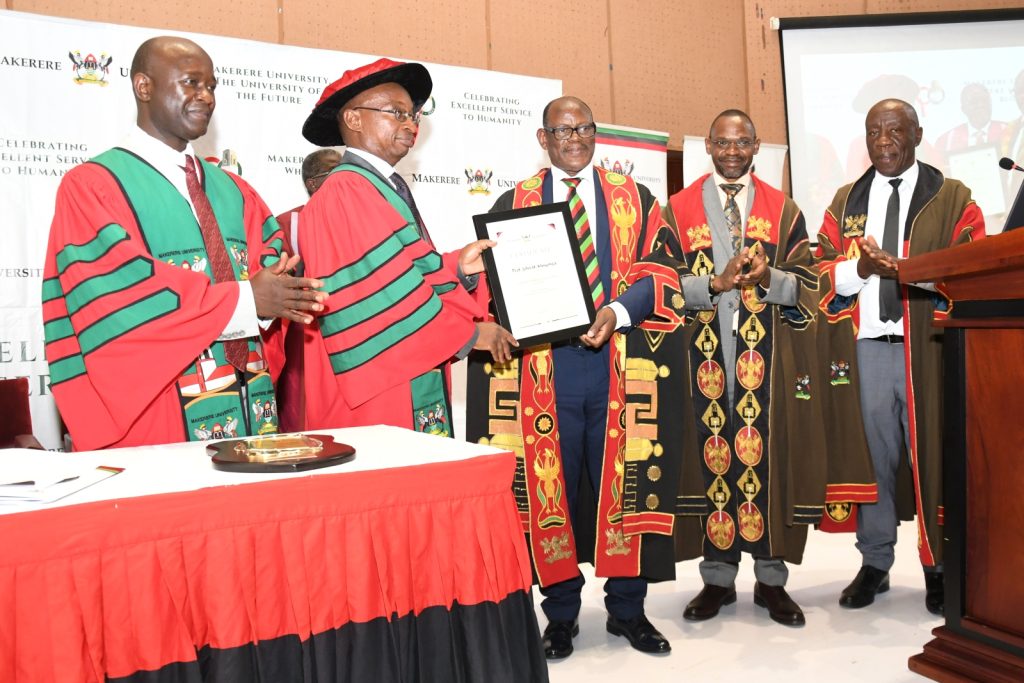
Remarks by the Vice Chancellor
According to Makerere University Vice Chancellor, Prof. Barnabas Nawangwe, an inaugural lecture is an occasion of significance in an academic staff member’s career at the university. It provides professors with the opportunity to share their achievements in research, innovation, engagement and teaching activities before an audience of members of the University community and the general public.
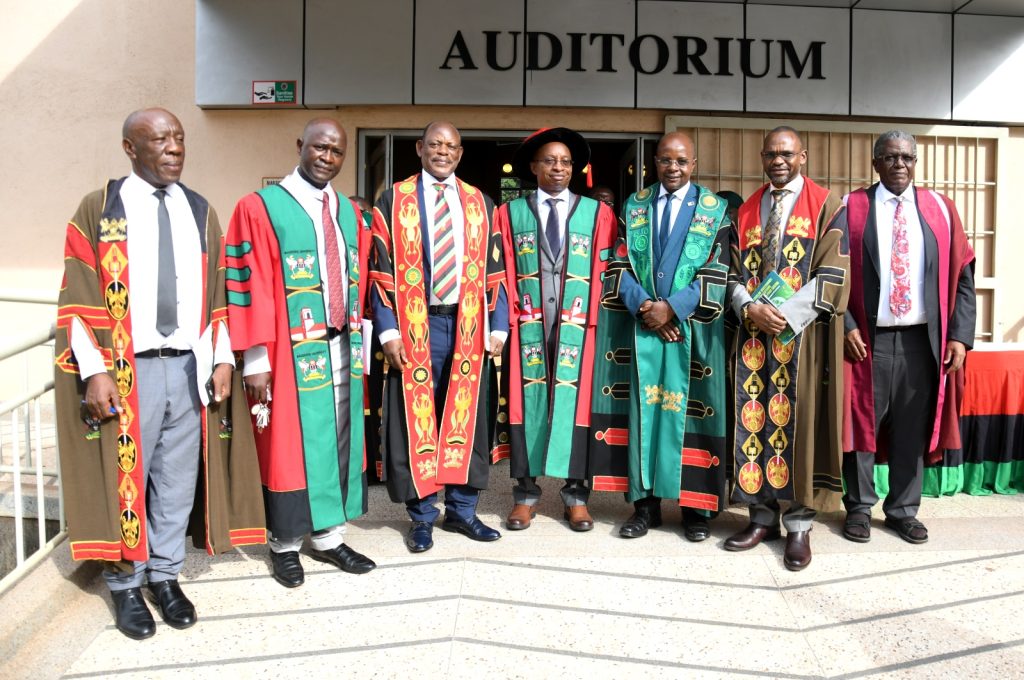
In his address, Prof. Nawangwe congratulated Prof. Muyonga for making all necessary preparations to deliver his Professorial Inaugural Lecture. “This is the way to go as we continue to boost our scholarship, image and reputation. The Professorial Inaugural Lecture should act as an inspiration to all of us as scholars to not only learn but also continuously disseminate our work. I want to implore other colleagues at the rank of Professor in the University to emulate Prof. Muyonga and also deliver their Professorial Inaugural Lectures.” The Vice Chancellor commended CAES for spearheading the initiative leading to Prof. Muyonga’s presentation and applauded the Professorial Inaugural Lectures Organising Committee (PILOC) led by Prof. David Bakibinga for a job well done in preparing for this event. Highlighting the significance of Prof. Muyonga’s lecture focus, “Circular bioeconomy: Applications to the agri-food sector”, the Vice Chancellor noted that it was quite novel and contemporary, testifying that Makerere University possesses the competencies and capacities to substantially address the national and global development challenges. “Our science, creation of new knowledge and innovations in this field will be crucial for national stability cognizant of Uganda’s rapid population growth and high levels of youth unemployment. As a premier university, we should harness the emerging opportunities including artificial intelligence which appears to be a game changer to find practical solutions to complex societal challenges at multiple scales,” he explained.

Remarks by the DVCAA
In his remarks, the First Deputy Vice Chancellor in charge of Academic Affairs, also host of the Inaugural Professorial Lectures, Prof. Umar Kakumba said Prof. Muyonga’s research works had demonstrated Makerere’s commitment and contribution to the realization of the national and global development agendas. “As academics, we have a duty to think and address the needs of the growing population, projected to reach 60 million in 2030 and 102 million in 2060. The research done by Prof. Muyonga contributes to the realization of the SDGs2,3,9,12 aimed at reducing hunger; ensuring good health and wellbeing, generating employment and income through innovation; and reversing the current consumption trends as well as promoting a more sustainable future.”
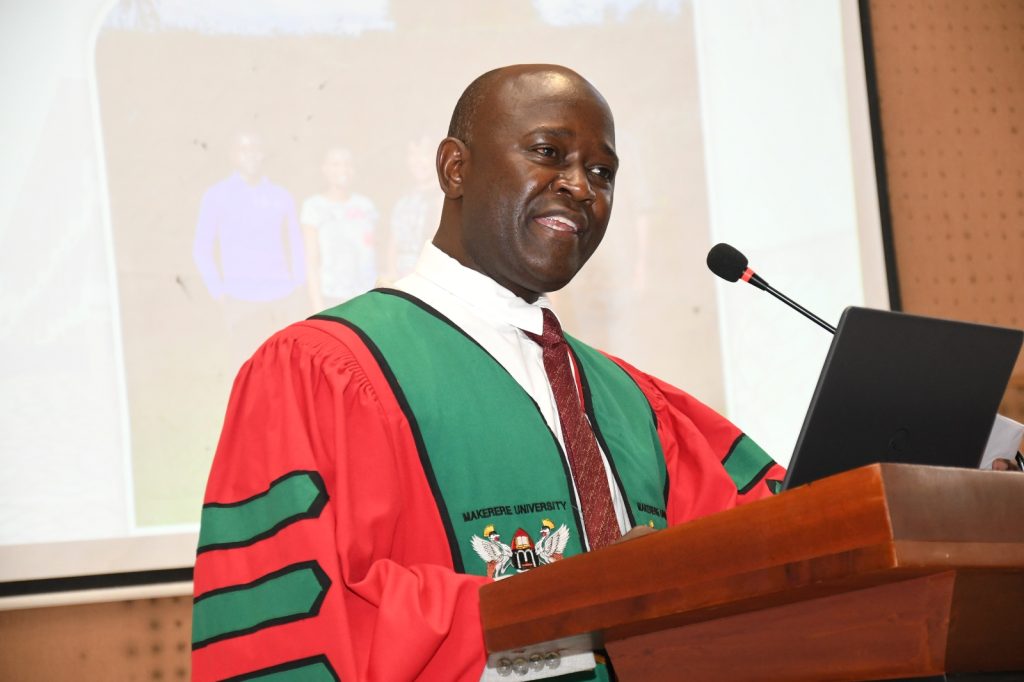
Prof. Muyonga’s biography
Prof. Muyonga holds a PhD in Food Science from the University of Pretoria, M.Sc. Food Science from Cornell University and a B.Sc. Food Science and Technology from Makerere University. He became full Professor of Food Science of Makerere University in 2010, and has served as Faculty at Makerere University since 1997. Prof. Muyonga was Head of the Department of Food Science and Technology from 2006 to 2011, during which period the Department transformed to the now School of Food Technology, Nutrition and Bioengineering and served as the pioneer Dean of the School. He has published over 80 peer reviewed journal articles, mainly in areas of nutraceutical and physico-chemical properties of traditional Ugandan foods, improvement of traditional food handling and processing methods, extrusion technology, novel drying techniques and agri-food waste valorisation. Prof. Muyonga serves as Associate Editor of two (2) international journals and his work has been cited in over 3,900 articles.
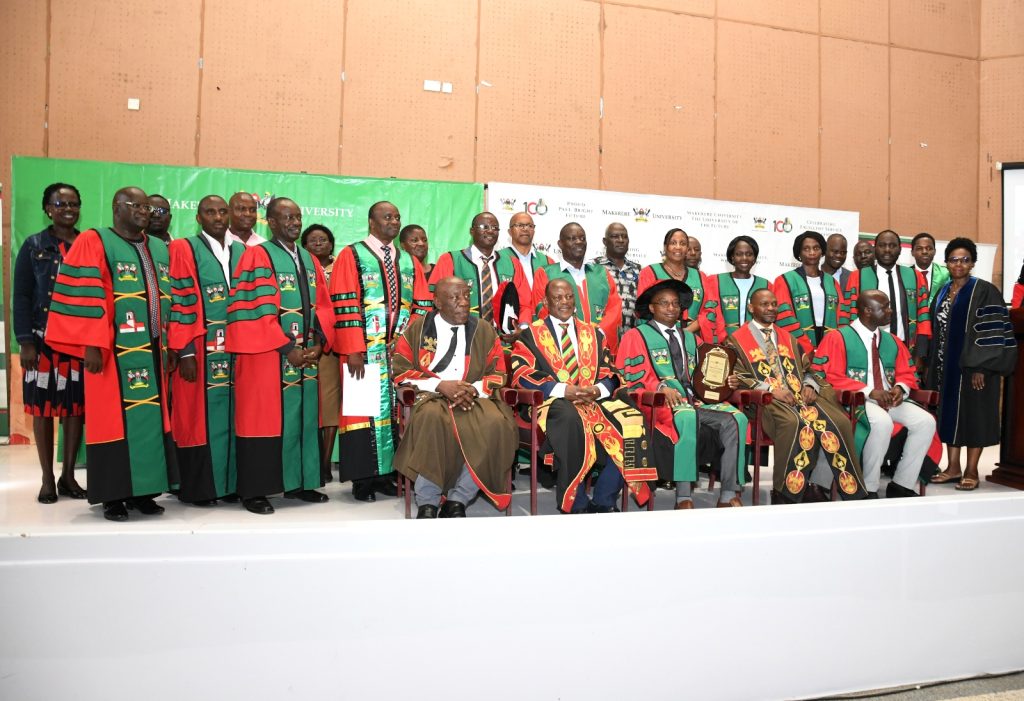
Prof. Muyonga has played critical roles in the development of capacity for food science and nutrition research and research translation in Uganda. He has led more than twenty (20) research and consultancy projects and raised over 20 million US$ for research, technology translation and institutional development. He has been key in developing research capacity on previously under researched foods including grain amaranth, jack fruit, pumpkins, Solanum anguivi (katukuma), and Nile perch, among others. As a university administrator, Prof. Muyonga coordinated the implementation of several institutional development initiatives, including a NORAD funded institutional development project for Makerere University’s Department of Food Science and Technology and the setting up of a Technology and Business Incubation Centre at Makerere University.
Under his leadership, the Department of Food Science and Technology and the School of Food Technology, Nutrition and Bioengineering initiated four (4) new degree programmes, registered great improvement in research infrastructure, greatly increased graduate students’ enrolment and graduation rates, markedly increased output of peer reviewed research articles and supported commercialisation of dozens of new food products. He has served on several boards, advisory and technical committees, and is currently Chair of the Management Committee of the National Agricultural Research Laboratories, as well as board member of Volunteer Efforts Development Concerns. Prof. Muyonga is a Fellow of the Uganda Academy of Sciences and professional member of the Institute of Food Technologists (USA). He was the 2009 TWAS young scientist, is an alumnus of the Global Young Academy, UN University and TWAS affiliate programme. He was previously member of the scientific advisory committee of the Bill and Melinda Gates funded Banana Biotechnology Programme and served as Technical Evaluator for the World Bank African Centres of Excellence for Central and Western Africa and for the European Commission research programmes. Prof. Muyonga is also a Rotarian and has served in several roles in his club (Rotary Club of Kampala North). He is a Paul Harris Fellow (PHF+3) and is actively engaged in numerous Rotary projects supporting the underserved.
